TERC Blog
Climate and Equity Institute: A model for transformative professional learning
Eleven high school teachers selected from more than 90 applicants came to the Schoodic (Maine) Institute from July 21st to 27th, 2024, for TERC’s third Climate and Equity Institute, funded by the John D. and Catherine T. MacArthur Foundation. Teachers came from both coasts, northern and southern states, and the middle of the country. As in previous years, teachers came in roughly equal numbers from rural, urban, and suburban schools serving a wide diversity of students. The pattern of the week was similar to that developed in the first two years. Every day was packed!
About the project
The Climate and Equity project (terc.edu/climateandequity) plans to transform how climate and equity are taught by reducing teacher isolation and supporting collective growth.
Goals: The incidence of extreme climate impacts is increasing. Levels of eco-anxiety and existential dread related to global warming among youth are at record highs. Education about global warming, and its inequitable impacts, is urgently needed, yet teachers who address this need are isolated. The project hosts small groups high-school teachers at a one-week, expenses-paid Climate and Equity Institute at the Maine seashore. Teachers discuss and exchange ideas and best practices for equitable pedagogy, discuss the global and psychological impacts of climate change, explore climate change impacts firsthand through guided field trips, and have ample free time to enjoy the Maine woods and seashore.
Outcomes: Teachers will become founders of a national network of colleagues and leave with a renewed sense of hope and purpose.
To help teachers make the most effective use of our time together, we have worked to make our design principles as explicit as possible for the teachers, so that they can use our thinking to support their own sense-making. To this end, our team has done a top-to-bottom examination of our design.
We found that all the various strands of this complex week can be summarized under three categories — Pedagogy, Biocomplexity, and Equity (Figure 1).
Our design for these institutes has many layers, aimed at supporting the teachers’ learning and reflection. What we cannot schematize is how the people who gathered at the Institute made these ideas into living action. The teachers and invited session conveners (speakers) all brought their history and expertise, and also their open questions about their own practice, and the experiences of their students. The Institute succeeded, we believe, in creating a setting in which this rich wealth of experience as well as dilemmas of practice, could be addressed together. One teacher’s response in a post-survey about the institute overall exemplifies what we have heard from teachers over the last three iterations,
From the beginning, the institute was a breath of fresh air, literally and figuratively. The efforts that were made to create a particular professional development experience centered around the driving question—what are the qualities that distinguish effective climate education and equity—were palpable… The variety of activities, including opportunities for deeper reflection and sharing… set the conditions for our particular cohort to gel in a way that some of us may have hoped for but none of us really expected. This underscored the importance of creating “brave spaces” for me as I really think that the quality of the experience was determined by how much people felt welcomed and encouraged to bring their whole brilliant selves to the table. (Evelyn)
I feel like it shifted my thinking in some big picture ways. It’s not so much about specific activities or lessons (although there are a few of those). It’s more about bigger concepts like the power of narrative for developing empathy, making climate instruction more trauma-informed, maintaining active hope, and humanizing education in general. (Megan)
The three Institute components
We define biocomplexity as human-nonhuman interdepen- dence, and the inclusion of politics, laws, history, economics in science. Because biocomplexity infused all discussions during the week, we describe the other two Institute components, Equity and Pedagogy, in more detail below.

Equity
The institute began by emphasizing teacher voice and leadership: each teacher introduced themself and their practice on the first day. Each teacher raised some issue of equity, either as a success or a challenge in practice, related to, for example, addressing inequitable classroom practices or talking about the inequitable impacts of climate change due to systemic inequities. Diana De Paula, a 2023 Fellow, picked up on these threads and led an inspiring presentation and discussion on the meaning and practice of equity in the science classroom, a conversation that continued throughout the week.

Teachers reflected a wide range of responses when asked at the end of the week what they had gained from attending the Institute. One teacher talked about validation for her work focused on equity,
They [the teachers] echoed and validated the importance of the work l do—empowering the marginalized [students] to aspire to the top through hard work and taking action to mitigate the pronounced effects of climate change in their communities. (Veronica)
Another resolved to infuse her conversations, action and curriculum with a stronger focus on climate and equity,
This Institute was different than any other professional learning experience. A new goal that I now have is to continue the climate and equity conversation as I go forward and participate with other groups. For example, I am looking forward to attending the state STEM Institute and visiting with other teachers about climate and equity curriculum. After this week, I am really interested to see what others in my state are doing. (Beth)
Another important equity focus was addressed by three returning fellows: Abe Cohen-Garcia (‘22), Kelli Grabowski (‘23) and Jen Keller (‘23). Each respectively led a session on climate and equity from the point of view of urban, suburban, and rural settings. A teacher expressed the importance of seeing the connections across these landscapes as follows,
I appreciate how you categorized the sessions into Urban, Suburban, and Rural. Observing the challenges faced by teachers in different locations helps me analyze the equity issue across the US. Where a student lives and attends school affects the resources available to them, including the quality of teachers and available learning materials, as well as their interactions with the natural environment in their communities. (Agnes)
With respect to equity, a teacher commented on two of the returning fellow’s sessions in a post-institute survey,
I found Diana’s framework around social justice: personal, instructional, institutional, systemic, to be helpful for examining dilemmas around equity, and was inspired by her model of thinking outside the box… Likewise Jen’s…naming of intergenerational equity affirmed my thoughts around our students and how they are the inheritors of generations of societal ills as well as environmental crises (Evelyn).
Pedagogy
Three elements of the pedagogy component that are stressed in the institute include the need to acknowledge student anxiety, the importance of connecting/re-connecting with nature, and empowering students to take action to help combat anxiety and feelings of despair and powerlessness.

Acknowledging anxiety
Dr. Susanne Moser, a renowned climate scientist known for her research addressing the human dimensions of climate change, and on climate change communication, convened two powerful sessions on the emotional and psychological challenges of teaching and learning about climate change, often layered on top of emotional challenges and traumas students have already experienced. As in prior years, these sessions with Dr. Moser had significant impact on the teachers. Three teachers described their responses to her sessions,
I was profoundly affected by Dr. Susi Moser’s session. Despite my 16 years of teaching science, I have never before addressed the emotional toll and sense of helplessness that students may experience when exploring how humans have altered or influenced changes in Earth’s systems… The institute will have specific effects on what or how I teach… I will address climate data, emotions, healing, and love. (Beth)
It will certainly make me more mindful. I am always mindful of student trauma and climate anxiety, but I feel far moreaware of how the two are intertwined. (Sam)
I have taught Climate Change in the past without taking into consideration the trauma the students may be going through. [This week] I have learned to consider options for students to express what they feel and suggest strategies to minimize stress. (Veronica)
Dr. Susanne Moser is Director and Principal Researcher of Susanne Moser Research & Consulting in Hadley, Massachusetts, the unceded territoryof the Nipmuc and Pocumtuc. She also is a Research Faculty in the Environmental Studies Department at Antioch University, New England. She is a research scientist whose work focuses on equitable adaptation and transformation in the face of climate change and interlocking stresses. She is a geographer by training with an interest in how social science can inform society’s responses to the existential challenges arising from the climate crisis.
 Connecting with nature
Connecting with nature
We emphasized the importance of connecting with nature when teaching about climate change and engaged teachers in multi-disciplinary ways with nature themselves. We took a guided walk through the Maine coastal forest and onto the rocky seashore, led by Schoodic ecologist Dr. Chris Nadeau. We highlighted the importance of narrative by spending an evening telling stories of the wonder and delight we have personally experienced in nature.
I am going to get my students outside regularly so they can sit in nature, touch grass, and observe the changes that happen around them. (Clara)
We also immersed ourselves in “Place” by sketching the seaside landscape, led by renowned plein air landscape artist, Jill Hoy.
Taking action
The strategy of empowering students to take action as an antidote to climate anxiety was exemplified by a student panel, brought to the institute by Margo Murphy, a 2022 fellow. The six students talked about climate actions they are taking in their Maine school and community for example, fundraising for a school wind turbine, educating elementary students about food waste and composting, and learning how to be able to influence change in the community. They dazzled the teachers with both their energy conservation actions and their lobbying the state legislature, as well as their articulateness and sense of empowerment,
The panel with Margo’s students was a big highlight for me—my school has a small “Green Team”, and seeing the dedication and enthusiasm of her students started a LOT of wheels turning in my head about how to move my own students to a higher level of involvement. (Owen)
Bringing it all together
Starting midway through the institute, teachers began working to process the first three days’ experiences in relation to their own practice, launched by Kirstin Milks, a 2022 Fellow.
In small groups they imagined and planned how their teaching and their collaborations could change in the coming year. They all saw the community among the Fellows as a key source of inspiration and support for their efforts. Ideas included place-based, project-based activities like native plant gardening in light of indigenous knowledge; long-term student research and action to “green” their school; presenting workshops about climate and equity for colleagues; and development of more interdisciplinary curriculum and teaching. Teachers also imagined some next steps in their own professional development paths, as teacher leaders. Teachers expressed their excitement about taking their experience home with them. For example, two teachers commented,
I am also excited to attempt to collaborate with other disciplines, specifically language arts and civics. I have tried this in the past,but now have some more concrete ideas that I can approach them with, such as activities related to place based projects and literacy activities. (Beth)
I actually intend to lead my own PD on the subject… I will also steal lessons from everyone else [at the Institute] and am happy to have contacts to work with. (Sam)
Continuing the work
All three cohorts of Fellows will continue to meet during the coming year. In a first zoom meeting, the first and second cohorts will meet their third cohort colleagues. Teachers have expressed their appreciation for the opportunity to continue hearing from each other and continue to gain inspiration and encouragement from hearing what other Fellows are doing.
Three of the first Fellows had an article recently published in the Knowles Foundation’s Kaleidoscope. It is a significant contribution to the development of “best practices” for climate and equity education. https://t.ly/CsIZx
Closing statement
We have tried to design this institute to reflect TERC’s best principles of professional learning—seeing learning as a socio-cultural process deeply engaged with scientific and social phenomena, and fundamentally an inquiry that includes investigation, action, expression, and reflection in a complex and dynamic mix. Our teachers and all our other colleagues have brought this vision to life in their own way over the past three summers. As one teacher described it,
Participation in this institute has supported my goals for my professional learning. My professional learning goals before the institute were to engage with educators with diverse experiences, foster authentic partnerships, deepen science learning, and liberate trauma. Myneeds were to identify points of light, leverage my influence, co-learning/co-teaching, and foster the hopes and dreams of my community. The institute has set a framework for my work and an opportunity to grow and sustain a reaffirming science and learning communitythrough authentic partnerships. (Candace)
Applications for the 2025 institute will open in January 2025.
Acknowledgements
We are grateful to the John D. and Catherine T. MacArthur Foundation for supporting this experiment in design, learning, and action.
We thank the teachers and our colleagues Folashadé Solomon and Annie Sussman, all of whom have been integral to this work.
Bios
Gillian Puttick is a Senior Scientist at TERC. She focuses most of her efforts on climate change education, addressing it from a biocomplexity and systems perspective, stressing the myriad socio- ecological interactions of life and environment.
Brian Drayton, a plant ecologist, is a Senior Scientist at TERC. Since 1989, much of his work at TERC with teachers and curriculum has dealt with climate change ecology and its human dimensions.
Read the entire issue: Hands On Fall 2024

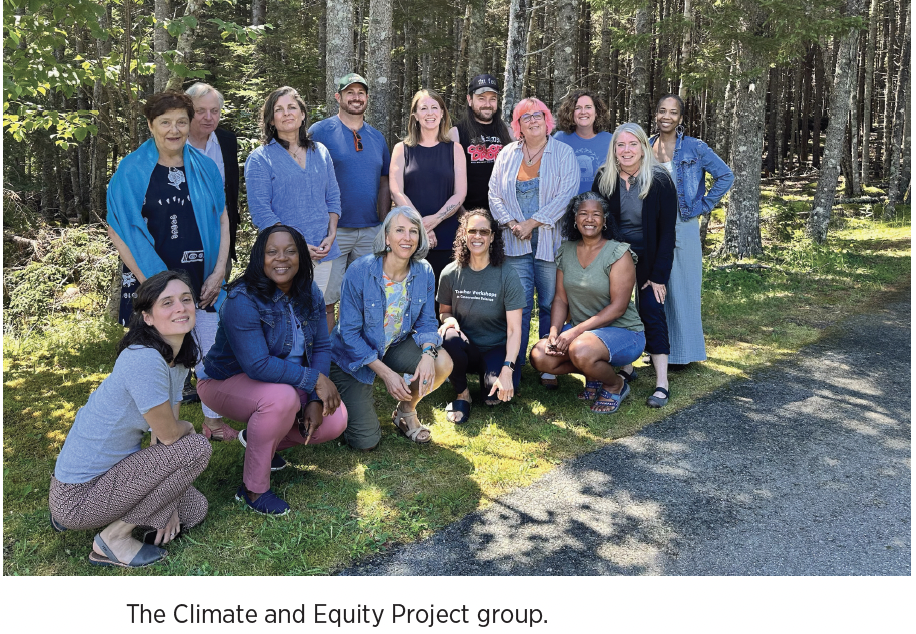




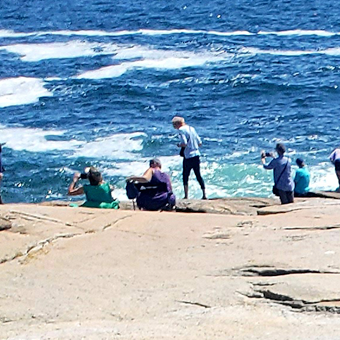
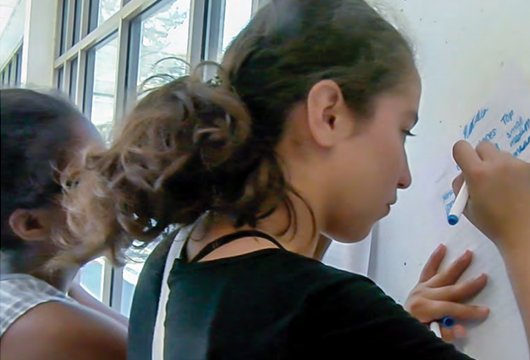
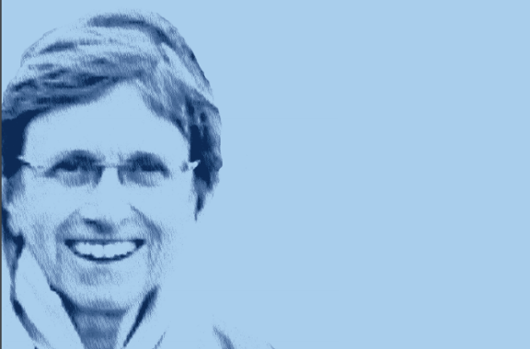
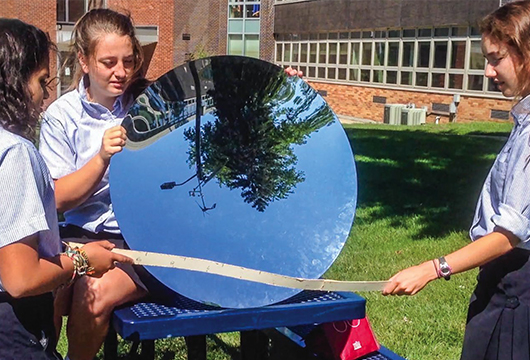
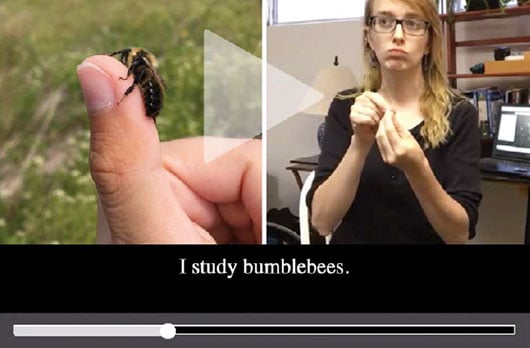
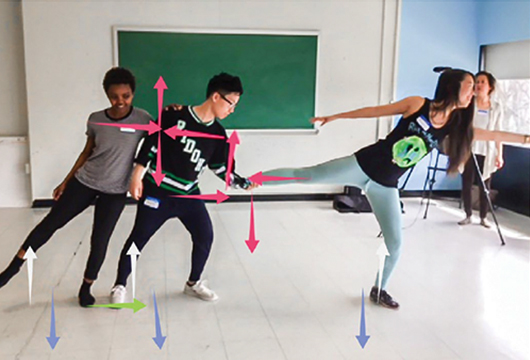
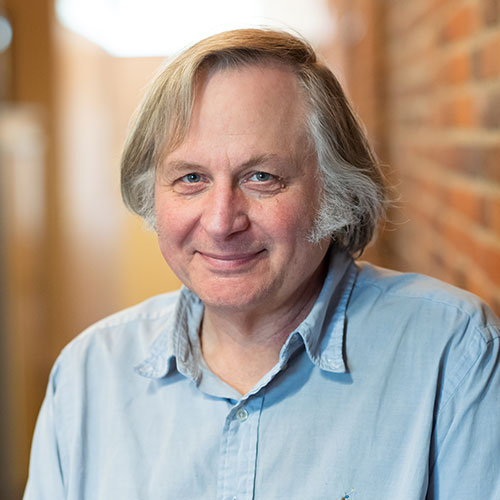
.jpeg)